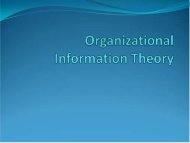Syllabus
Syllabus
Syllabus
You also want an ePaper? Increase the reach of your titles
YUMPU automatically turns print PDFs into web optimized ePapers that Google loves.
Creativity & Information Technologies ITEC 2961- Fall 2012<br />
Course Description<br />
Creativity & Information Technologies ITEC 2961- Fall 2012<br />
Prof. Curtis Bahn<br />
T.A.: Helen Bullard<br />
crb@rpi.edu<br />
bullah@rpi.edu<br />
class website: http://www.arts.rpi.edu/crb/classes/creativity<br />
Lecture Tuesday 12:00 - 1:50 Classroom: West Hall 112<br />
Lab Sections: Weds. 12:00 or 2:00 Lally 02<br />
Office hours by appt.<br />
Where do creativity, innovation, culture and technology collide In this course we<br />
will explore creativity by planning, designing and realizing individual and<br />
collaborative creative projects. We will also study the working process of creative<br />
innovators in a variety of fields to develop an understanding of creativity in a<br />
broader context. Through your projects and class participation - you will define<br />
what is Creativity and IT.<br />
Lecture: Weekly lectures cover basic concepts relating to the creative process, as<br />
well as providing a forum for discussion of issues related to students' individual<br />
creative projects. Examples of a variety of artists and methods will be discussed;<br />
guest lectures will feature case studies of individual creative process. You have to<br />
be there; often the lecture can inform what you do in the workshop.<br />
Lab: The Lab sessions will follow up on lectures, discuss readings, engage in<br />
class exercises, discussions, as well as give individual critiques of ongoing<br />
projects.<br />
Learning Outcomes:<br />
By the end of the course, students will be able to:<br />
- Apply concepts of creativity, the creative process, and case studies of<br />
creative individuals, to their own individual fields of study.<br />
- Conceptualize, research, plan, and schedule the development of a<br />
personal creative project.<br />
- Use different conceptual and technical tools to organize and develop<br />
creative projects.<br />
- Communicate their ideas effectively and creatively using a variety of<br />
media.<br />
1
Creativity & Information Technologies ITEC 2961- Fall 2012<br />
Assignments and Requirements<br />
Complete details of these assignments will be provided as they are assigned.<br />
Final Project (40%)<br />
Your class final project, and the process by which you arrive at its development<br />
and presentation, will be the main goal and objective of this class. This should<br />
ideally be something relevant to your course of study that will enhance your<br />
portfolio and give you experience developing your own creative ideas that you<br />
would not otherwise have in your Rensselaer experience.<br />
Since you come from a wide array of backgrounds and have very different<br />
interests and skill sets, the parameters of this project are very open. It will be up<br />
to you to determine your interests and your own creative view of how information<br />
technology could be used to benefit your field, society, or some niche application<br />
that you can envision.<br />
You will be asked to brainstorm many different ways that IT could be used in your<br />
field or related fields that are of interest to you; to write and sketch in your journal<br />
about them and to mind map them. Narrowing in on specific areas, you will<br />
research work that may have already been done with similar approaches or results<br />
to what you are interested in doing. You will narrow in on one approach and<br />
present a project proposal and timeline to the class for comments and feedback.<br />
With the possibility of forging collaborative groups and revising your project<br />
proposals based on class feedback, you will go forward to produce a proof of<br />
concept demonstration and finally present your final project on the last days of<br />
class.<br />
The process you undergo in researching, proposing and developing your project<br />
is as important as the final result. This is not something that you can do in the last<br />
days before the final presentation, but rather a disciplined and sustained<br />
investigation into your view of the creative applications of IT in your field.<br />
There have been comments in the past that this course did not apply to specific<br />
skills or concepts in your field. This project challenges you to imagine how you<br />
can use this time, guidance and the input of your teachers and classmates to create<br />
something that is interesting to you and relevant to your progress and goals.<br />
Mindmapping (2%)<br />
You are required to download and install “Freemind” mind mapping software:<br />
http://freemind.sourceforge.net/wiki/index.php/Download<br />
2
Creativity & Information Technologies ITEC 2961- Fall 2012<br />
Grading<br />
You will be asked to develop at least one mindmap and give at least one class<br />
presentation using this software.<br />
Journals (10%)<br />
You are asked to keep a physical journal which you carry to class and lab each<br />
week. There will be assignments pertaining to this journal, and you will be asked<br />
to hand it in at various times for feedback.<br />
Biography/Case Study (20%)<br />
You will be asked deliver in lecture a multimedia presentation on some figure in<br />
your field or related field of IT that you find to be a creative and innovative<br />
figure. This presentation can relate strongly to your interests and developments<br />
for your project.<br />
Two EMPAC presentations (10%)<br />
http://empac.rpi.edu/<br />
You are required to attend two events at EMPAC, and to write a response of at<br />
least one page for each presentation with a particular eye to the creative use of<br />
information technology.<br />
Attendance, Visitors, Class Exercises, and Participation (20%)<br />
Much of what we do in the class is experiential. Your attendance and<br />
participation is necessary. Every week we will engage in activities during class<br />
that aim at heightening awareness, “waking up” the body/mind, and get those<br />
creative juices flowing. We will have special guests who will talk to us about<br />
their work and offer new ideas and creative exercises. We will have open lab<br />
sessions where you can work individually, or with a collaborative group recieving<br />
feedback from instructors or classmates.<br />
Readings and Media<br />
You will be asked to read articles, view videos, visit and evaluate websites or<br />
other media. These exercises will be related to class discussions and/or journal<br />
entries. There is a list of media on the class website and at the end of this<br />
syllabus.<br />
There will be a great deal of creative freedom in this course. We expect everyone<br />
to be involved in an ambitious, creative, and conscientious way. The main rule is<br />
to communicate about what you are doing and your progress. With<br />
communication, and agreement with your instructors, assignments can be<br />
modified to fit your creative process and needs.<br />
3
Creativity & Information Technologies ITEC 2961- Fall 2012<br />
Grading Percentage Breakdown.<br />
40% The final project has many aspects beginning the first day of class. There<br />
is a great deal of freedom, but also the need for ongoing reports and<br />
communication about your process including (weighting approximate):<br />
2 % - brainstorming mindmap<br />
3 % - research into similar work that might have been done<br />
5 % - project proposals and revisions<br />
10 % - proof of concepts demonstration<br />
10% - final project presentation in Lecture<br />
10% - final submitted materials and<br />
5 page evaluation paper outlining project, process and results.<br />
10% For keeping a Journal, not counting specific assignments which may<br />
be in your Journal such as EMPAC responses.<br />
20% Presentation of creative figure biography/case study.<br />
10% Attendance of 2 EMPAC events and 1 page report of experience in<br />
Journal. EMPAC report should focus on role of IT in performance as well<br />
as other observations.<br />
20% For attendance and participation in Lecture and Lab.<br />
All readings and assignments are to be completed by the date given in the<br />
formal assignment handouts. Late assignments will carry a lower grade. Be<br />
prepared to discuss assignments and readings in class. Percentages and<br />
assignments are subject to change, any changes will be discussed in class.<br />
Required Text and Materials<br />
There are no required texts to purchase . You will occasionally be asked to<br />
download readings, software or other materials for discussion and class<br />
assignments. See the end of the syllabus and the class website for the list of<br />
media and readings.<br />
Your class project material(s) will be of your own choosing. And so you may want<br />
to decide early what materials are best suited to your skills, curiosity and means<br />
ie: clay, musical instruments, recording or photography materials, robotics kits,<br />
web design software. You will need to provide or access the materials needed for<br />
your final on your own so please plan ahead.<br />
Attendance and Absence Policy<br />
Attendance is crucial in this course because much of the class is based in<br />
discussion, special guests and experiential exercises. If you miss any classes, you<br />
are expected to make up the missed work on your own.<br />
4
Creativity & Information Technologies ITEC 2961- Fall 2012<br />
You are allowed one unexcused absence from lecture. After that, the each absence<br />
will diminish your final grade. If you miss four lectures, you will fail the course.<br />
The only exceptions will be with a written excuse from the appropriate Rensselaer<br />
office to your situation.<br />
You are allowed one unexcused absence from Lab. If you miss four Lab sessions<br />
without you will fail the course.<br />
Laptop, PDA, Cell Phone Policy<br />
As a courtesy to the seminar please do not make personal use of devices for email,<br />
texting or other communications or gaming while attending the seminar. Use<br />
devices only for in class assignments.<br />
Academic Dishonesty Policy<br />
Collaboration between students in this course is strongly encouraged. Likewise,<br />
students are encouraged—indeed, to some extent required—to exchange ideas,<br />
opinions, and information constantly. You are encouraged to help each other with<br />
performance, production, and presentation of projects.<br />
Plagiarism of any kind is in direct violation of the University Policy on Academic<br />
Dishonesty as defined in the Rensselaer Handbook, and penalties for plagiarism<br />
can be severe. In this class you will be expected to attribute due credit to the<br />
originator of any ideas, words, sounds, or work which you incorporate<br />
substantially into your own work. This applies particularly to citation of sources<br />
for quotes and ideas included in your compositions.<br />
Below is the Academic Dishonesty Policy as found in the Rensselaer Handbook<br />
of Student Rights and Responsibilities:<br />
ACADEMIC DISHONESTY<br />
Intellectual integrity and credibility are the foundation of all academic work. Academic<br />
dishonesty is, by definition, considered a flagrant offense to the educational process. It is<br />
taken seriously by students, faculty, and Rensselaer and will be addressed in an effective<br />
manner.<br />
If found in violation of academic dishonesty policy, students may be subject to two types<br />
of penalties: the instructor administers an academic (grade) penalty, and the student may<br />
be subject to the procedures and penalties of the student judicial system outlined in this<br />
handbook.<br />
Since academic dishonesty is a violation of the Grounds for Disciplinary Action, the<br />
student may be subject to any of the following sanctions: disciplinary warning;<br />
disciplinary probation; disciplinary suspension, expulsion and/or alternative actions as<br />
agreed on by the student and hearing officer. It should be noted that no student who<br />
allegedly commits academic dishonesty will be able to drop or change the grade option<br />
for the course in question.<br />
5
Creativity & Information Technologies ITEC 2961- Fall 2012<br />
The definitions and examples presented below are samples of types of academic<br />
dishonesty and are not to be construed as an exhaustive or exclusive list. The academic<br />
dishonesty policy applies to all students, undergraduate and graduate, and to scholarly<br />
pursuits and research. Additionally, attempts to commit academic dishonesty or to assist<br />
in the commission or attempt of such an act are also violations of this policy.<br />
Academic Fraud<br />
The alteration of documentation relating to the grading process. For example, changing<br />
exam solutions to negotiate for a higher grade or tampering with an instructor’s grade<br />
book.<br />
Collaboration<br />
Deliberate facilitation of academic dishonesty in any form. For example, allowing<br />
another student to observe an exam paper or allowing another student to “recycle” one’s<br />
old term paper or using one another’s work in a paper or lab report without citing it as<br />
another’s work.<br />
Copying<br />
Obtaining information pertaining to a graded exercise by deliberately observing the paper<br />
of another student. For example, noting which alternative a neighboring student has<br />
circled on a multiple-choice exam.<br />
Cribbing<br />
Use or attempted use of prohibited materials, information, or study aids in an academic<br />
exercise. For example, using an unauthorized formal sheet during an exam.<br />
Fabrication<br />
Unauthorized falsification or invention of any information in an academic exercise. For<br />
example, use of “bought” or “ready-made” term papers, or falsifying lab records or<br />
reports.<br />
Plagiarism<br />
Representing the work or words of another as one’s own through the omission of<br />
acknowledgment or reference. For example, using sentences verbatim from a published<br />
source in a term paper without appropriate referencing, or presenting as one’s own the<br />
detailed argument of a published source, or presenting as one’s own electronically or<br />
digitally enhanced graphic representations from any form of media.<br />
Sabotage<br />
Destruction of another student’s work. For example, destroying a model, lab experiment,<br />
computer program, or term paper developed by another student.<br />
Substitution<br />
Utilizing a proxy, or acting as a proxy, in any academic exercise. For example, taking an<br />
exam for another student or having a homework assignment done by someone else.<br />
6
Creativity & Information Technologies ITEC 2961- Fall 2012<br />
COURSE OUTLINE<br />
subject to change, consult webpage for the latest schedule and deadlines<br />
WEEK <br />
Topics and assignments <br />
What is Creativity<br />
1. Tues. August 28 Introduction - What is creativity.<br />
Lab August 29 Mindmaps and brainstorming<br />
DUE: creativity & IT mindmap and journal entry.<br />
download :<br />
read:<br />
http://freemind.sourceforge.net/wiki/index.php/Main_Page<br />
Chrysikou, Evangelia G., Your Creative Brain at Work. Scientific<br />
American Mind, July/August 2012, 24-31.<br />
2. Tues. Sept. 4 Guest: Ryan Jenkins, EMPAC tour<br />
Lab Sept. 5 Discussion of final project parameters<br />
Readings and Video: What is creativity<br />
3. Tues. Sept. 11 Guest: Tomie Hahn - Shifting POV<br />
Lab Sept. 12 Readings and Video: Creativity and Point of View<br />
4. Tues. Sept. 18 Guest: Helen Bullard - Seeing the (extra)ordinary<br />
Lab Sept. 19 Readings and Video: Creativity and Point of View<br />
Creative Objects<br />
5. Tues. Sept. 25 Project Proposals presented in class.<br />
Lab Sept. 26 Readings and Video: Creativity and Innovation<br />
6. Tues. Oct. 2 Guest: Ryan Smith -Music and Animated Notations<br />
Lab Oct. 3 Readings and Video: Creativity and Innovation.<br />
7. Tues. Oct. 9 NO CLASS (Monday schedule)<br />
Lab Oct. 10 Readings and Video: Creativity and Innovation<br />
8. Tues. Oct. 16 Guest: Heather Dewey-Hagborg<br />
Lab Oct. 17 Video: Innovator Biographies - Jobs and Gates<br />
9. Tues. Oct. 23 10 min Class presentations: Biographies.<br />
Lab Oct. 24 Video: Innovator Biographies - Jobs and Gates <br />
10. Tues. Oct. 30 “Guest:” Curtis Bahn - Tradition and Innovation.<br />
7
Creativity & Information Technologies ITEC 2961- Fall 2012<br />
Lab Oct. 31 Readings and Video: Technology, Culture and Collaboration<br />
11. Tues. Nov. 6 Guest: Heidi Boisvert - Socially Responsible Games<br />
Lab Nov. 7 Readings: Creativity and Play <br />
12. Tues. Nov. 13 Proof of concept demonstration in class.<br />
Lab Nov. 14 Readings and Videos: Technology, Culture and Collaboration<br />
13. Tues. Nov. 20 Open lab, individual help on projects/presentations.<br />
no Lab: thanksgiving 21 - 25<br />
14. Tues. Nov. 27 Final Presentations<br />
Lab Weds. Nov. 28 Open lab, individual help on projects/presentations.<br />
15. Tues. Dec. 4 Final Presentations<br />
Last class, no lab. all class materials due by end of day Dec. 5th.<br />
8
Creativity & Information Technologies ITEC 2961- Fall 2012<br />
Media<br />
The class will draw from these videos, readings and websites in addition to others TBA.<br />
Readings:<br />
What is Creativity<br />
Chrysikou, Evangelia G., Your Creative Brain at Work. Scientific American Mind, July/<br />
August 2012, 24-31.<br />
Michalko, M., 21 Ways to Kill Creativity. The Creativity Post, Feb 11, 2012.<br />
http://www.creativitypost.com/create/21_ways_to_kill_your_creativity<br />
Csikszentmihalyi, M. (2000). Flow: The Psychology of Optimal Experience (Chapter<br />
4). Harper Collins.<br />
Resnick, M. (2007). All I Really Need to Know (About Creative Thinking) I Learned<br />
(By Studying How Children Learn) in Kindergarten. ACM Creativity & Cognition<br />
conference, Washington DC, June 2007.<br />
Creativity and Point of View<br />
Gardner, H. (1998). A Multiplicity of Intelligences. Scientific American.<br />
Creative Objects<br />
Turkle, S. (2007). Evocative Objects: Things We Think With (Introduction).<br />
Technology, Culture and Collaboration<br />
Fischer, G. (2011). Understanding, fostering, and supporting cultures of participation.<br />
interactions, 18(3), 42-53.<br />
Papert, S. (1980). Mindstorms: Children, Computers, and Powerful Ideas (Chapter 8:<br />
Images of the Learning Society). New York: Basic Books.<br />
Rusk, N., Resnick, M., Berg, R., & Pezalla-Granlund, M. (2008). New Pathways into<br />
Robotics: Strategies for Broadening Participation. Journal of Science Education and<br />
Technology, 17(1) 59-69.<br />
Creativity and Play<br />
Flanagan, M. (2009). Critical play: Radical game design (Chapter 8). Cambridge, MA:<br />
MIT Press.<br />
Videos:<br />
What is Creativity<br />
Tim Brown: Tales of creativity and play (28:00)<br />
http://www.ted.com/talks/tim_brown_on_creativity_and_play.html<br />
Mihaly Csikszentmihalyi: Flow, the secret to happiness (19:00)<br />
http://www.ted.com/talks/mihaly_csikszentmihalyi_on_flow.html<br />
Amy Tan: Where does creativity hide (23:00)<br />
9
Creativity & Information Technologies ITEC 2961- Fall 2012<br />
http://www.ted.com/talks/amy_tan_on_creativity.html<br />
David Kelley: How to build your creative confidence (11:47)<br />
http://www.ted.com/talks/david_kelley_how_to_build_your_creative_confidence.html<br />
Creativity and Point of View:<br />
Joshua Walters: On being just crazy enough (5:51)<br />
http://www.ted.com/talks/joshua_walters_on_being_just_crazy_enough.html<br />
Elizabeth Gilbert : new ways to think about creativity (19:32)<br />
http://www.ted.com/talks/elizabeth_gilbert_on_genius.html<br />
Neil Harbisson: I listen to color (10:00)<br />
http://www.ted.com/talks/neil_harbisson_i_listen_to_color.html<br />
Creativity and Innovation<br />
Anil Gupta: India's hidden hotbeds of invention (22:55)<br />
http://www.ted.com/talks/anil_gupta_india_s_hidden_hotbeds_of_invention.html<br />
Arvind Gupta: Turning trash into toys for learning (15:31)<br />
http://www.ted.com/talks/arvind_gupta_turning_trash_into_toys_for_learning.html<br />
Isaac Mizrahi on fashion and creativity (14:14)<br />
http://www.ted.com/talks/isaac_mizrahi_on_fashion_and_creativity.html<br />
Dan Phillips: Creative houses from reclaimed stuff (18:00)<br />
http://www.ted.com/talks/dan_phillips_creative_houses_from_reclaimed_stuff.html<br />
Behrokh Khoshnevis - Contour Crafting: Automated Construction (12:00)<br />
https://www.youtube.com/watchfeature=player_embedded&v=JdbJP8Gxqog#!<br />
Harvard: Soft robots in color (1:33)<br />
http://news.harvard.edu/gazette/story/multimedia/soft-robots-in-color/<br />
Biographies<br />
Steve Jobs: Good artists copy great artists steal (:40).<br />
https://www.youtube.com/watchfeature=player_embedded&v=CW0DUg63lqU<br />
Steve Jobs and Success (1:29)<br />
https://www.youtube.com/watchv=KuNQgln6TL0&feature=related<br />
Steve Jobs on 60 minutes (15:48 and 13:00)<br />
http://www.youtube.com/watchv=1jqSK8Qv4ZY&feature=youtube_gdata_player<br />
https://www.youtube.com/watchv=CXcfDN6L9d8&feature=youtube_gdata_player<br />
Steve Jobs Documentary (47:00)<br />
https://www.youtube.com/watchv=zhWChAihstQ&feature=youtube_gdata_player<br />
1990 Steve Jobs lost interview (54:00):<br />
https://www.youtube.com/watchv=11-x28DWiCY&feature=related<br />
10
Creativity & Information Technologies ITEC 2961- Fall 2012<br />
Bill Gates Unplugged (48:45)<br />
https://www.youtube.com/watch<br />
index=12&feature=PlayList&v=6b6DEUM5Gbw&list=PLBCD362F95A724D1E<br />
Technology, Culture and Collaboration<br />
Natalie Jeremijenko: The art of the eco-mindshift (19:51)<br />
http://www.ted.com/talks/natalie_jeremijenko_the_art_of_the_eco_mindshift.html<br />
Larry Lessig: Laws that Choke Creativity (19:00)<br />
http://www.ted.com/talks/larry_lessig_says_the_law_is_strangling_creativity.html<br />
Innovation at Google - Douglas Merril (51:00)<br />
http://www.youtube.com/watchv=2GtgSkmDnbQ&feature=youtube_gdata_player<br />
The Myths of Innovation (51:48)<br />
https://www.youtube.com/watchv=m6gaj6huCp0&feature=relmfu<br />
Creating a Culture of Innovation - David Kester, Chief Executive, Design Council<br />
(10:17) .<br />
http://www.youtube.com/watchv=KyqHGdIMcas&feature=youtube_gdata_player<br />
No Time to Think - David M. levy (58:08).<br />
http://www.youtube.com/watchv=KHGcvj3JiGA&feature=youtube_gdata_player<br />
Creativity and Learning<br />
Schools kill creativity: Ken Robinson (19:29)<br />
http://www.ted.com/talks/ken_robinson_says_schools_kill_creativity.html<br />
Websites:<br />
The Creativity Post:<br />
http://www.creativitypost.com/<br />
improve your brain health and performance, luminosity:<br />
http://www.lumosity.com/app/v4/personalization<br />
3 exercises to improve your creative thinking skills<br />
http://www.entrepreneurs-journey.com/7670/3-exercises-to-improve-your-creative-thinking-skills/<br />
TED: the creative spark: http://www.ted.com/themes/the_creative_spark.html<br />
11



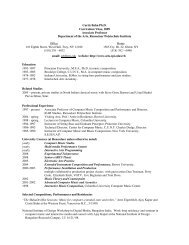
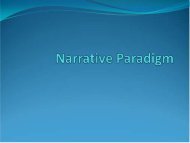
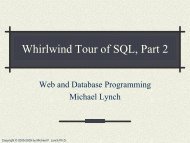
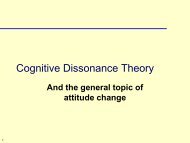
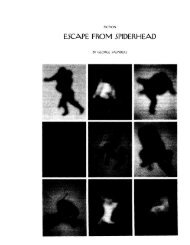
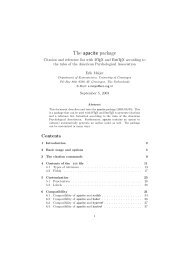
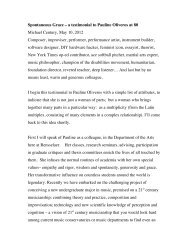
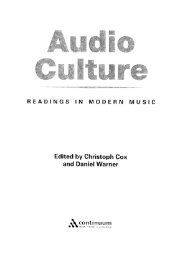
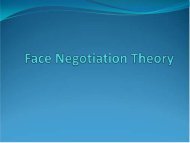
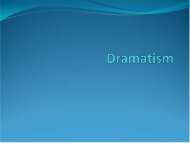
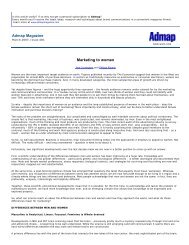
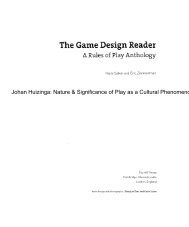
![The Game Design Document [.pdf]](https://img.yumpu.com/30117124/1/190x245/the-game-design-document-pdf.jpg?quality=85)
